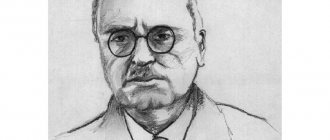Greetings, friends!
If several centuries ago, you asked the question: “what is nostalgia,” then the answer would have been unequivocal - “homesickness.” However, in the modern world the meaning of this term has changed and acquired a different emotional coloring. Let’s take a closer look at what is meant by the word “nostalgia” today, how this term appeared, and the most interesting thing is to find out why the modern generation is nostalgic. Well, are you ready? Then let's begin.
What is nostalgia?
Nostalgia is an emotional state that combines sad and pleasant feelings associated with memories of events, places or times from the past to which a person would like to return.
The term is of Greek origin and is formed from two words: “nostos” (return to homeland) and “algea” (mental pain). But in the modern world, this feeling is associated not only with one’s native land, but also with the past in general - with a serene childhood, stormy youth, rich youth and simply bright pleasant memories.
The first to describe in detail what nostalgia is was the Swiss physician Johann Hofer, who introduced this term into official medicine in 1688. He noticed an unusual psychological phenomenon that manifested itself in soldiers serving far from their homeland. Their mental state was greatly depressed, but after returning to their native lands they instantly returned to normal.
From the end of the 17th century until the beginning of the 20th century, nostalgia was classified as a neurological disease. Modern psychology explains this feeling with longing not only for specific places, but also for the past in general. Any person becomes attached to his native places and the circumstances and people surrounding him. And when the realization comes that it will no longer be possible to recreate the same conditions, pain and sadness arise. These feelings are especially acute among old people remembering their youth.
Where does nostalgia originate in the brain?
In an experiment conducted at Tilburg University in the southern Netherlands, social and behavioral science expert Ed Vingerhoets found that certain songs not only make people nostalgic, but also feel warmer. After following a group of students for a month, Xinyue Zhou, a professor at Sun Yat-sen University in China, found that nostalgic moods were more likely to occur on cold days. Thus, people who are in a cold room are more likely to relive memories than those who are in a warm room. This connection between body and mind leads scientists to think that nostalgia may have had evolutionary value for our ancestors, prompting them to continually seek shelter and food to survive. There is no doubt that this psychological phenomenon occurs in the brain, but where exactly?
Modern neuroimaging methods have helped answer this question. In an experiment, Japanese scientist Kentaro Oba decided to find out which areas of the brain are active when viewing children's photographs. The presence of activity was observed in the hippocampus, the region of the brain responsible for storing memories, as well as the ventral striatum, the region responsible for the feeling of reward. It turns out that indulging in nostalgia is useful and pleasant, but not if you are diagnosed with depression and anxiety disorders.
First mentions and descriptions of the phenomenon
Homer was the first to give a fairly accurate description of nostalgia in the poem “The Odyssey” (written in the 8th century BC). In modern translations, the protagonist's wanderings are presented as adventures. But according to the author’s idea, Odysseus was doomed by the gods to many years of wandering and separation from Penelope. His longing for his homeland and his beloved is described in great detail in the poem.
The phenomenon, as noted above, was introduced into medical science by Johann Hofer in the 17th century. He described in detail what nostalgia is, how it arises and manifests itself. For a long time, this condition was considered a disease. The main “sick people” were traditionally soldiers - young and impressionable guys who found themselves far from their homes for the first time.
At the beginning of the 20th century, the nostalgic state was no longer considered a disease. It began to be seen as regret about events and experiences from the past that a person would like to experience again. A characteristic feature of such memories is that a person can miss even difficult times.
Soviet and Russian actor Vladimir Borisov appropriately compared nostalgia to sclerosis, since it makes you remember pleasant moments from the past, completely forgetting about the terrible circumstances of that time.
Why do generations think it was better in their time?
Adults and older people often say that everything was better in their time. And this is considered a completely normal phenomenon, because perhaps young people in the future will say the same thing to their children.
This is also explained by the fact that our memory filters negative events and leaves in memory only those memories that bring warm emotions and feelings. Perhaps adults believe that the past was much brighter due to the fact that they were younger, perceived things more simply and were full of strength and energy. Therefore, among psychologists, such an opinion is not considered erroneous or harmful to the human psyche. Moderate nostalgia is a normal state for a person.
What is nostalgia like?
According to the results of numerous studies, nostalgic experiences always manifest themselves in approximately the same way. But depending on the cause, their nature may differ slightly. There are three main types of nostalgia:
- To my native places
. The most studied type of experience, characteristic of people who find themselves far from their homeland. Even if in a new place a person has a lot of opportunities and his standard of living increases sharply, he may yearn for his native land, where he spent his childhood and youth. - According to the past
.
This condition manifests itself in people to whom their own life seems boring and not bright enough. They remember facts from their own past, invent and embellish them, add positivity and “cross out” bad events. As a result, memories become more pleasant and serene , and the person yearns for the past even more. - According to emotions associated with a person
. We all tend to miss people. But sometimes we are not just sad about the person we would like to meet, but we remember and mentally replay the pleasant situations we experienced together. This state is also nostalgia from a psychological point of view.
Smell is the driving force behind nostalgia
Interestingly, nostalgia can be caused by more than just general things, such as listening to an old song or visiting a place that reminds you of your childhood. In fact, the sense of smell is much more important in the development of nostalgia than any other sense. The connection between smell and emotions was established in the early 1900s by the famous neurologist Sigmund Freud. The nose connects to the olfactory lobe, a part of the brain that plays a role in emotions. As a result, smells can have a stronger impact on emotions than any other sense. This phenomenon, known as the Proust phenomenon, is the reason why bakeries deliberately spread the smell of freshly baked bread, because it often evokes a strong feeling of nostalgia and subconsciously “forces” people to buy bread.
Nostalgia of the modern generation
We have more or less figured out what the term “nostalgia” is and how it appeared. But, you see, the most interesting thing would be to find out what nostalgia is for the modern generation , what do our contemporaries understand by this term? Search engines helped us find out, as they most accurately determine which events, times or phenomena people most often mention in the context of the word nostalgia. And here are the 3 most popular results.
3rd place: nostalgia for childhood in the 90s
Childhood of the 90s is my childhood too. I can say with confidence that it was unique, unique, and will never be repeated among future generations of children. Yes, modern childhood also has its advantages, but it is so different from what we had.
We didn’t have the Internet, smartphones, and at first even regular landline phones. The toys were simple, we invented entertainment for ourselves, and when we wanted to invite our friends for a walk, we shouted to them right under the windows. Our childhood was simple and poor , and it was this lack of abundance that made us truly appreciate the little that we have! At this time, a lot of toys began to appear that were just the ultimate dream for us. Game consoles “Dandy”, “Tamagotchi”, Tetris, lasers... It was amazing!
Nowadays, any child has a smartphone in which he can watch whatever he wants at any time. And we, in order to watch our favorite cartoons, for example, had to wake up on time and watch the TV so as not to miss it. Without smartphones, without computers and social networks, we found ourselves in an incredible time that will never happen again.
2nd place: nostalgia for the 80s
I didn't see the eighties. But those who lived during this time feel especially nostalgic for them. One of the most memorable and striking events of that time: the 80 Olympics in Moscow. The atmosphere there was unique, warm, sincere, and the closing was very emotional. In addition to the Olympics, a very vivid memory is the appearance of the first technology, which at that time was outlandish for many - cassette recorders, players with headphones, televisions.
1st place: nostalgia for the USSR
A record number of mentions of the word “nostalgia” among the modern generation is associated with the period of the USSR. Despite the fact that almost 30 years have passed since the collapse of the USSR, its unique atmosphere, simplicity, unity and sincerity continue to arouse genuine interest among the modern generation. And although I myself did not find the USSR at a conscious age, I myself look with great pleasure at photos of this period, study history, and dream of traveling back in time at least for a few hours and plunging into this unique atmosphere of the Soviet Union.
It affects different generations differently
In 1991, researchers conducted an experiment with randomly selected participants at the Water Tower Place shopping center in Chicago. The goal was to determine how nostalgia affects people of different ages. During the experiment, 989 people were asked which scents reminded them of their childhood. It found that nearly 87 percent of subjects born in 1930 or later had evidence of olfactory memory, compared with only 61 percent of those born before 1930. Those. Young people tend to experience more nostalgic feelings caused by smell than older people.
This makes sense because a person's sense of smell typically declines with age. More interesting is the difference between the responses of older and younger people. Subjects born before 1930 typically reported that smells such as pine, oak, and prairie grass evoked feelings of nostalgia. On the other hand, those born in 1930 or later said that the smell of things like plastic, jet fuel, and alcohol-based markers triggered the smell for them. These results suggest that older adults are more nostalgic for natural scents, while younger adults are more nostalgic for artificial scents.
Nostalgia: benefit or harm?
A person can control his thoughts well and occasionally allow himself to be immersed in pleasant memories, reliving happy moments from the past, enjoying his own successes and not regretting mistakes. If such immersion in the past evokes pleasant emotions and helps improve your mood, there is no reason to avoid it.
But the opposite situation is also possible. A person may indulge in memories to escape from pressing problems. He develops a real addiction, since living in a world of illusions is simpler and easier than struggling with real difficulties. Psychologists are unanimous that such nostalgia is undesirable and should be avoided by any means available. If you cannot overcome it on your own, it is best to consult a psychologist.
Who shouldn't indulge in nostalgia?
Memories of bright childhood moments, such as the image of your mother preparing your favorite dish, or the day when a pet came into the house, help lift your spirits. Still, nostalgia can have a negative impact on some people. According to a study conducted by psychologists from the University of Miami (USA), such memories make people suffering from depression even sadder. The reason is that they do not experience consistency between the positive self in their memories and the negative self-perception of themselves in the present moment.
What is nostalgia from the point of view of modern science?
Previously, this condition was considered a disease and was studied in psychiatry. Today nostalgia is studied by three different sciences:
- Psychology views this condition as a protective mechanism of the psyche, allowing a person to get rid of negative memories. But the past cannot be returned, and mistakes cannot be corrected, so a person “redraws” the picture of his life in his own memory.
- Philosophy believes that nostalgia is a mythical memory of a fictional “paradise” in one’s own past. A person gradually gains faith that this paradise existed , yearns for it and passionately dreams of returning there. A nostalgic mood is considered a valuable state suitable for philosophical reflection.
- Sociology believes that the feeling of nostalgia is characteristic not only of individuals, but also of social groups. Within the framework of this science, it considers such a phenomenon as “social nostalgia” - a universal longing for an unattainable ideal world , worsening during times of rapid change.
Modern marketers skillfully use nostalgic experiences when developing advertising campaigns. In specialized literature, the term “nostalgia marketing” is widely used. It involves actively appealing to the consumer’s feelings in advertising campaigns (for example, “tastes like when you were a child”).
Benefit for health
Over time, attitudes towards nostalgia have improved. It is now believed to have many positive mental effects. Psychology professor Christine Batcho found that nostalgia can increase positivity and creativity. The calming feeling of nostalgia can also reduce stress. Nostalgia may even help with depression, as memories can prevent feelings of loneliness and anxiety. What's more, nostalgia also helps strengthen social skills and personal relationships.
Why do nostalgic feelings arise?
From the point of view of modern science, a person plunges into such a state in order to feel happier or to briefly escape from pressing problems. Longing for the past can occur when a person experiences feelings and problems such as:
- doubts, internal contradictions;
- loneliness, uselessness;
- overwork, chronic fatigue;
- misunderstanding on the part of loved ones;
- self-doubt, confusion, weakness of spirit.
In an unstable economic, political and social situation, these feelings become aggravated. A person begins to feel nostalgic in order to mentally immerse himself in a state of confidence and stability.
According to scientific research, memories of pleasant events from the past are quite effective in influencing the production of happiness hormones. By immersing yourself for a few minutes in pleasantly exciting experiences, a person quickly improves his own mood , gains confidence and increases self-esteem.
Longing for the past does not always come under difficult circumstances. Sometimes a small thing seen or a song heard can serve as a catalyst. For example, you walk into a store and see a delicacy from your childhood wrapped in the same packaging (remember nostalgic marketing).
Suddenly there is an irresistible desire to experience the taste of childhood. You buy a treat, try it and rejoice. The mood improves, a state of psychological balance occurs. However, the taste may turn out to be different, and then disappointment sets in.
A record with a melody from childhood or a movie you watched many years ago, found in the attic, can cause similar experiences. Nostalgic feelings are especially strong if specific emotions are associated with a pleasant period of life - the first trip to the sea or a romantic relationship.
How to get rid of nostalgia?
Every day, 95% of yesterday's thoughts are spinning in our heads. That is, we today are not much different from us yesterday. Another paradox of nostalgia: our brain remembers not the event itself, but the last thoughts about it. That is, every time we embellish the past more and more. This is how we limit our future with past experiences.
In order for life to sparkle with renewed, colorful emotions, you first need to honestly answer the question: what is nostalgia? just memory or the desire to chew on dirty memories? Do I want to get high from real bright emotions, smiles, events today?
If you are ready to let go of the past, the advice of psychologists will help you turn on a kind of time machine that will help you radically change your life.
Tip 1. Close unfinished gestalts.
Our psyche is designed in such a way that it strives to bring everything to its logical conclusion. And until some task is completed, it remains a priority. Therefore, in ordinary life, the phenomenon of incomplete gestalt is similar to a frozen computer program. This could be an unfinished relationship, unfulfilled promises or desires. And if there are many such tasks, then the consciousness is simply not able to concentrate on the present.
It will not be possible to complete all gestalts at the same time. Moreover, some may be outside your zone of influence (resentment towards a deceased relative, for example). Therefore, it is worth conducting a kind of inventory, reconsidering your priorities and understanding the simplest unfinished events. And with complex cases it is better to deal with a psychotherapist.
Tip 2. Work with emotions.
Pleasant emotions tie us to the past. We smile when we look through old photographs, we close our eyes sweetly from the memories of our first kiss. At the same time, thoughts about the present or future cause anxiety, confusion, and a feeling of danger. Therefore, we consciously try to stay where we felt good and safe.
Working with emotions is mental work that is carried out in several stages. Of course, you shouldn’t forget about pleasant events, but you will have to set strict time limits for memories. Afterwards you will have to switch to current events. Surprisingly, sometimes a few minutes of joyful memories are enough to renew your strength for a new day.
Can nostalgia be harmful?
Time is fleeting, and every day more and more pleasant events are left behind. Circumstances change naturally, and many things from the past will be missed. Therefore, nostalgic experiences are common to every adult. You can refresh your feelings by returning to your homeland, visiting your home school or meeting with classmates.
But not everyone has this opportunity, and people begin to intensely yearn for the past. In such situations, nostalgic feelings become dangerous. A person is increasingly immersed in painful memories of the past. This condition becomes especially dangerous when combined with dissatisfaction with current living conditions.
If a person has no joys left in the present, he does not see guidelines and the meaning of life, painful longing for the past takes on a pathological character. Immersing himself in memories, he relaxes and feels serenity; returning to the present causes him real pain.
Is it possible to overcome pathological nostalgia on your own? With proper diligence, it is possible. You need to find a way to give maximum meaning to your real life - find a new job (or take on additional responsibilities in your old one), start a hobby, meet interesting people.
Rapid growth of public interest
In the last decade, nostalgia has become extremely important to society, mainly because of a psychologist named Constantine Sedikides. He felt nostalgic after moving from North Carolina to England, but soon discovered that nostalgia made him feel happy and optimistic about his future. This inspired the psychologist to further study nostalgia, and soon other universities began doing the same. Nostalgia has become a new area of study for psychologists, with hundreds of scientific papers written about it around the world. Nostalgia has now been confirmed to influence populations in 18 countries on five continents.
9. This feeling can be used for good.
As research into nostalgia grew, scientists began working on ways to harness the positive emotions derived from nostalgia for group therapy. For example, Alzheimer's disease and depression can now be helped with nostalgia-based therapy. Tim Wildschut, a partner of psychologist Constantine Sedikides, believes that nostalgia can be used to help victims of terrible events recover from moral trauma. The experiment found that nostalgic feelings evoked by memories led to improved attitudes toward overweight people. The same result was recorded in the case of people with disabilities.
How to spell the word correctly and why?
The check word is missing and cannot be checked. Because it's a dictionary word
, you can find its spelling in the dictionary.
It says that it needs to be written exactly like this: “nostalgia”
and
"nostalgic"
.
The word is declined according to cases:
| Case | Changing words by questions |
| I. p. - is there anything? | There is nostalgia. |
| R. p. - no what? | No nostalgia. |
| D. p. - glad about what? | Glad for the nostalgia. |
| V. p. - I feel what? | I feel nostalgic. |
| Etc. - under what? | Under nostalgia. |
| P. p. - about what? | About nostalgia. |
When analyzing a word according to its composition, we have the root - “nostalgia” and “I” - the ending.
The word consists of 10 letters, the emphasis falls on “and”. It has 4 vowels (o, a, i, i) and 6 consonants (n, s, t, l, ь, g).
Adviсe
- Don't think about the worst that can happen!
- Focus on what you are doing, not the people you miss.
- Stay in touch!
- Spend a lot of time with friends, so even if you want to cry from sadness, they will distract you and cheer you up.
- Try not to think about your loved ones and former friends, keep yourself busy with something so as not to think about them.
- Think about how lucky you are to have a place or people you care about and miss. It would be worse if you didn't miss them at all!
- There are many ways to set up your home elsewhere. So don't feel like you have to call just one place your home, you can make your home wherever you are.
- You will eventually get rid of homesickness. People are constantly moving, leaving to study, etc. So try to just get through it and enjoy life!
- Don't worry about what's going on at home. Focus on what you are doing and where you are, not on what is happening at home.
- If you miss your “other half”, then write him/her a love letter.
But it can also be used for evil
Despite all the positivity that nostalgia can bring, it can also be used to manipulate people. Just as the smell of fresh bread in a store can entice people to buy bread, nostalgia is used in everyday marketing. For years, advertisers have been researching how best to market to millennials (people born after 2000). They finally came to the conclusion that nostalgia was the most effective tactic. By using items from Millennials' childhoods to promote a variety of products, companies are trying to make people feel an emotional attachment to whatever is being advertised, enticing them to buy it.
This is why so many clothing brands produce products that promote the 90s, and why many brand logos use old-fashioned designs. While this is not inherently bad, it is certainly a way to manipulate consumers by appealing to their subconscious feelings. Nostalgia can also be used to promote positive attitudes towards minorities.
Subscribe to our Facebook page









